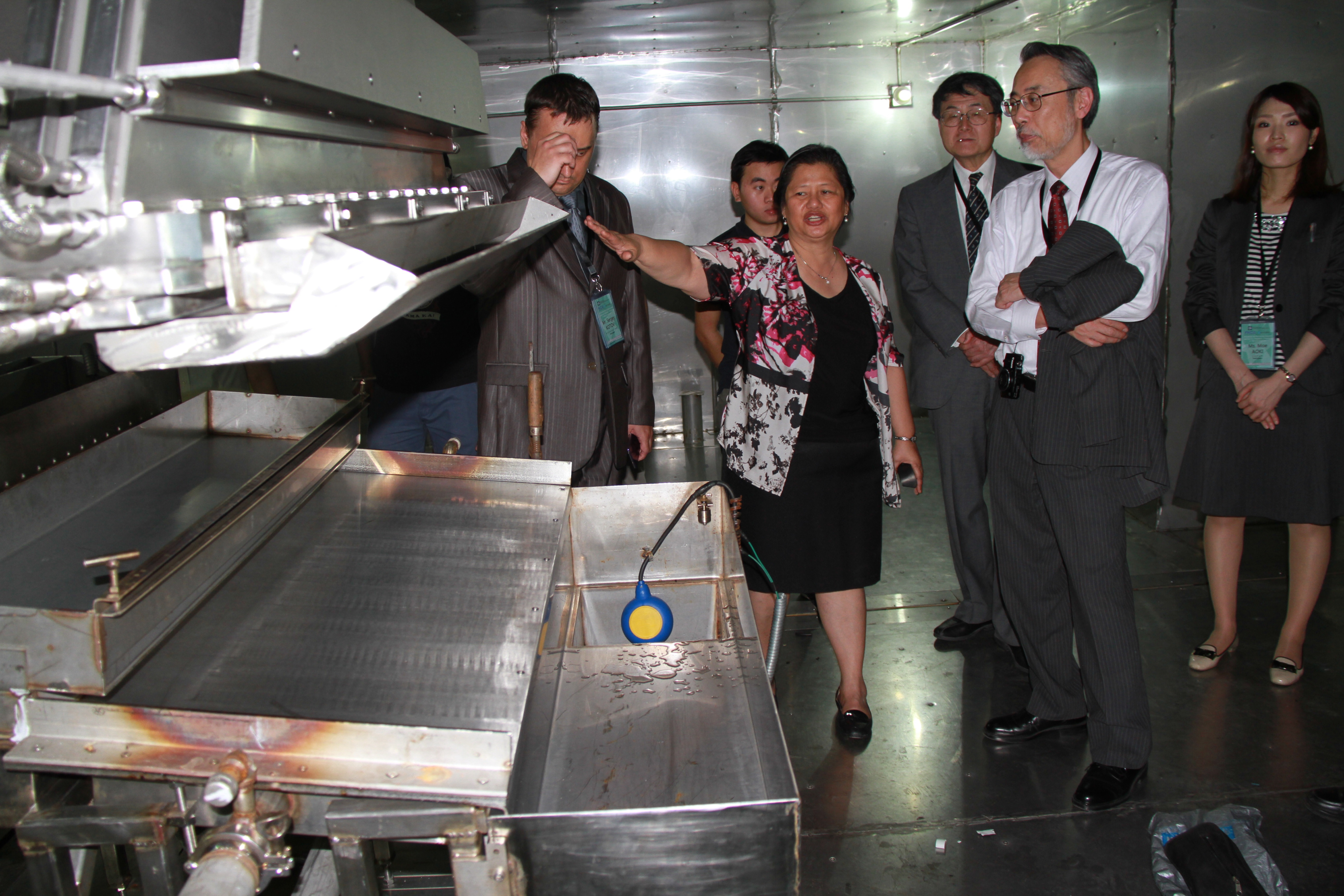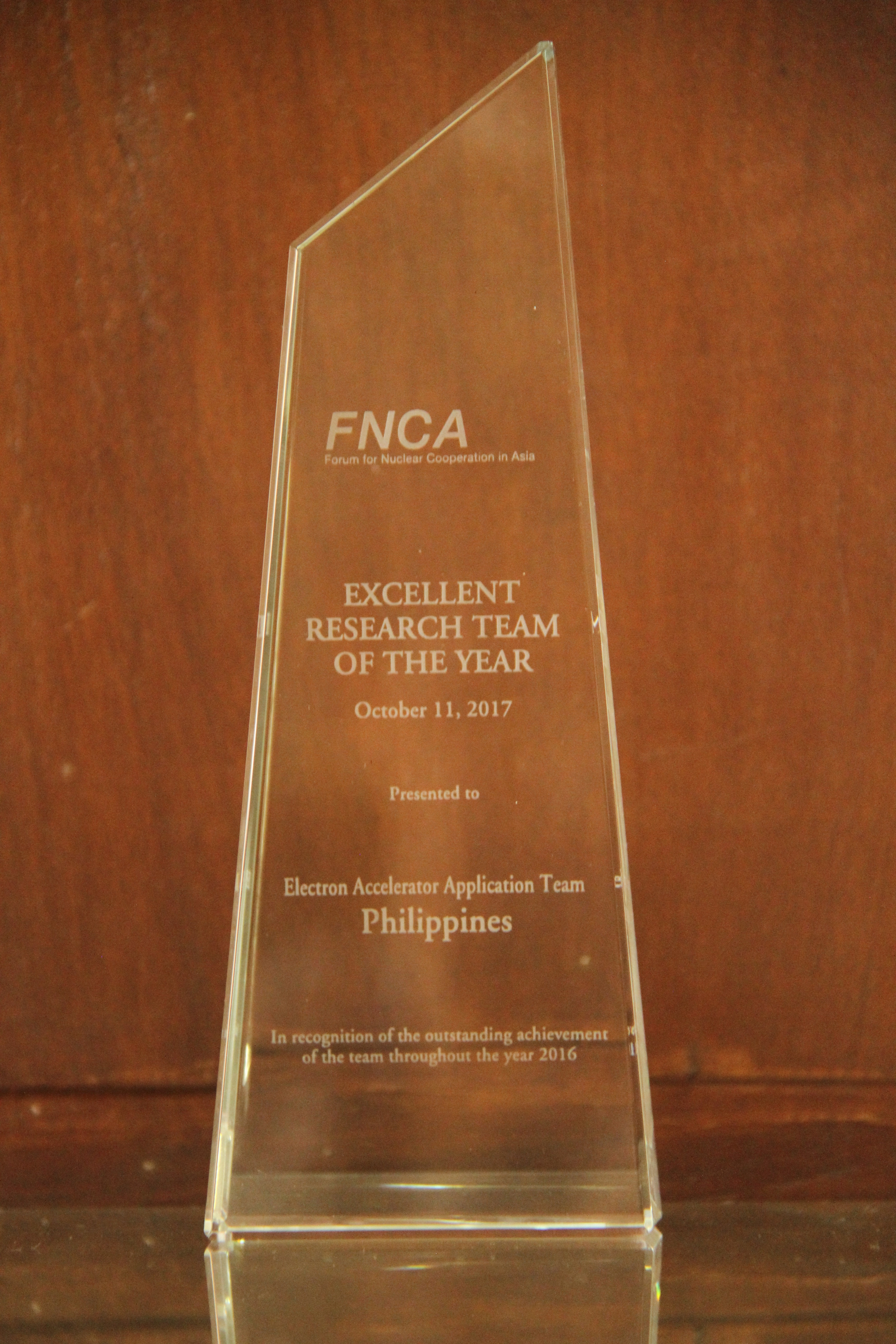
Dr. Lucile Abad, who headed the Plant Food Supplement (PFS) project, demonstrated the E-beam applications for radiation processing of the PFS to experts and participants in a seminar by the Forum for Nuclear Cooperation in Asia (FNCA) held in the Philippines. The liquid handling system was designed and fabricated by the PNRI Irradiation Services Section.


Left: The Plant Food Supplement (PFS) developed by PNRI scientists and researchers
Right: The FNCA Excellent Research Team of the Year Award for 2017
Filipino Plant Formula Wins Japanese Excellence Award
The Japanese government, through the Forum for Nuclear Cooperation in Asia (FNCA), has awarded the project team behind the Plant Food Supplement (PFS) of the Department of Science and Technology – Philippine Nuclear Research Institute (DOST-PNRI) with the 2017 FNCA Excellent Research Team of the Year Award for its success in radiation technology applications.
The award was granted on October 11, 2017, in time for the 18th FNCA Ministerial Level Meeting in Astana, Kazakhstan this year. The FNCA is a Japan-led cooperation framework for the peaceful applications of nuclear technology. Among the participating countries in the FNCA are Australia, Bangladesh, China, Indonesia, Japan, Kazakhstan, Korea, Malaysia, Mongolia, The Philippines, Thailand and Vietnam.
The research team was led by Career Scientist Dr. Lucille Abad who heads PNRI’s Chemistry Research Section, which spearheaded the development of the PFS to greatly contribute to Filipino agricultural development and food security, as well as to help mitigate the effects of El Niño and climate change that ravages farmlands in the countryside.
With just 3.2 liters per hectare of water mixed with the right proportion of the PFS, the formulation was proven effective in increasing the yield of rice, mungbean and other crops by over 20 percent. The field tests also demonstrated the improved resistance of rice applied with PFS against the rice tungro bacilliform virus infestation as well as bacterial leaf blight. In some instances, the fields sprayed with PFS withstood a violent storm better than the surrounding fields without it.
These PFS were made from natural polymers such as carrageenan, a common industrial ingredient extracted from seaweeds. Irradiation degrades these polymers to form natural bioactive agents that can improve the health and increase the growth and yield of various crops. The carrageenan used for the PFS was irradiated at PNRI’s state-of-the-art Electron Beam Irradiation Facility in Diliman, Quezon City, the first facility of its kind in the country dedicated to semi-commercial services.
After successful field experiments on rice has proven its superb advantages, the PFS project was officially launched in November 2015. The following month, DOST started the widespread testing of PFS in Luzon, Panay Island, Zamboanga and Davao.
To this end, PNRI produced more than several tons of PFS since 2015. The products were distributed to thousands of hectares of ricefields in selected provinces of Regions 2 and 3 – in Tuguegarao, Cagayan, Ilagan, Isabela and in Pulilan, Bulacan.
The development of the formula began under a cooperative project with the International Atomic Energy Agency (IAEA) back in 2009. The PFS project was funded by the Philippine Council for Agriculture, Aquatic and Natural Resources (PCAARRD), while the field trials were co-implemented under Dr. Gil Magsino of the National Crop Protection Center of the University of the Philippines - Los Baños (UPLB).












































